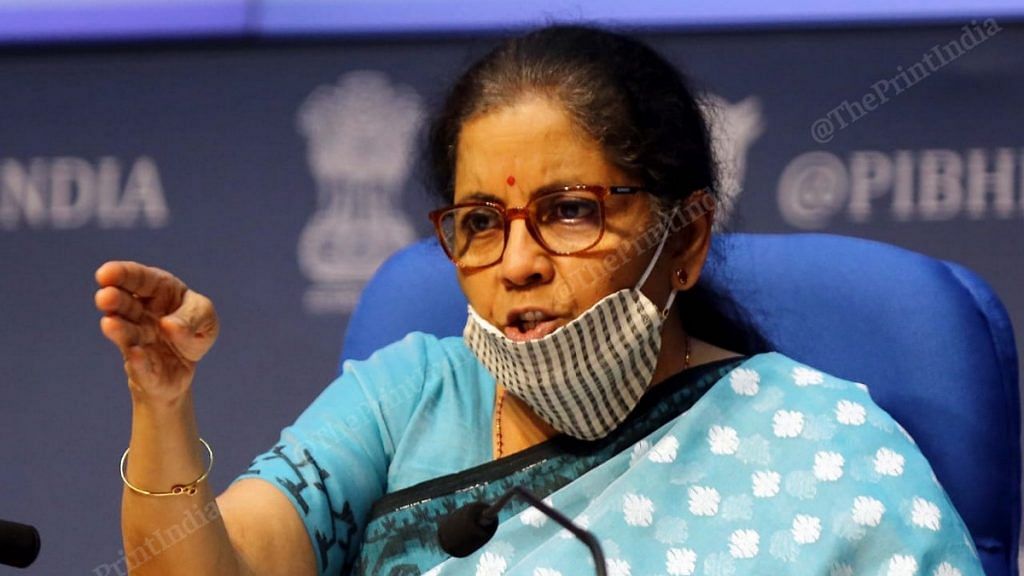New Delhi: The Goods and Services Tax (GST) revenue shortfall to states is estimated at more than Rs 3 lakh crore in 2020-21, but only around 22 per cent of this can be compensated through cess collections, the central government has estimated.
Of the Rs 3 lakh crore, Rs 1.5 lakh crore is the shortfall in the first four months of this fiscal itself, showcasing the massive impact of the Covid-19 pandemic and the subsequent lockdown on state finances.
Speaking at a press briefing after the meeting of the GST Council on the issue of compensation, Union Finance Minister Nirmala Sitharaman said that an “act of God (Covid) may result in contraction of the economy”, adversely impacting tax collections.
According to government estimates, compensation cess collections in the current fiscal will be around Rs 65,000 crore, leaving a gap of Rs 2.35 lakh crore.
Centre gives states two options
Following an opinion from the attorney general of India that the shortfall cannot be met through the Consolidated Fund of India, the Centre has proposed two options to states — either borrow Rs 97,000 crore (the estimated loss on account of a transition to GST but without taking into account the Covid-19 pandemic) or borrow the entire shortfall of Rs 2.35 lakh crore.
For both of these options, the government will discuss with the Reserve Bank of India an option of a special liquidity window that can be used by the states to borrow at a uniform rate of interest.
In addition, the repayment of interest and principal amount will be met through collection of the cess for a few years beyond 2022.
The arrangement will only be for one year and the council will decide afresh about the modalities for next year, said Revenue Secretary Ajay Bhushan Pandey.
To be sure, there is no clarity on how the states will borrow from the RBI.
At the time of the GST rollout in July 2017, the central government had assured the states of full compensation from any losses arising due to a transition to GST for a period of five years.
This means that states have to be compensated until July 2022 for any losses. The compensation would meet the shortfall in revenue to the states assuming a 14 per cent growth annually in GST revenues and will be collected through a cess levied on certain sin or luxury goods like tobacco and luxury cars.
Also read: BJP & non-BJP states join hands to take on Modi govt over unpaid GST dues
What states are saying
States are reluctant to borrow and have instead asked the central government to borrow.
They pointed out that the central government may be able to get the loan at cheaper rates and that the Centre is bound by the Constitution to pay the full compensation.
They also pointed out that the Centre has not paid the two compensation instalments due for the April-July 2020 period and is using it as a bargaining chip to pressurise states.
States have sought a time of seven working days to discuss the Centre’s proposal and revert.
In a separate press briefing after the GST Council meeting, Punjab Finance Minister Manpreet Singh Badal said, “A solution has been thrust on states. We are not happy with this outcome.”
He added that if a state doesn’t agree to the Centre’s proposal, it should be allowed to activate the dispute resolution mechanism as provided in the GST Act.
Chhattisgarh Finance Minister T.S. Singh Deo questioned why the Centre cannot borrow in one go and compensate the states instead of violating the provisions of the Constitution.
Puducherry Chief Minister V. Narayanasamy said that even BJP-ruled states like Karnataka and Bihar favoured that the central government should borrow to compensate the states.
He also said that many states favoured extending the levy of cess for five years beyond 2022.
Thomas Isaac, Kerala Finance Minister, questioned the government’s distinction of GST losses as Covid and non-Covid, pointing out that the Constitution makes no such distinction.
The attempt of Centre to introduce a distinction in revenue shortfall as due to implementation of GST and as that caused by Covid and that latter doesn’t deserve to compensated fully is not constitutionally valid. Constitution makes no such distinction.#GSTCouncilMeet
— Thomas Isaac (@drthomasisaac) August 27, 2020
Not the right time for rate hikes
Sitharaman said that it was broadly agreed that this may not be the right time to talk about an increase in the cess rates as a way to increase the collections under the compensation fund.
Increasing existing cess rates on luxury and sin goods and bringing more items under the levy of cess were some of the proposals that were being floated by the states. However, the Covid-19 pandemic and the subsequent economic contraction has ruled out this possibility.
Sitharaman added that she was grateful to states that there was no attempt to politicise the issue.
Also read: India’s Covid-ravaged states seek more funds from Modi govt
